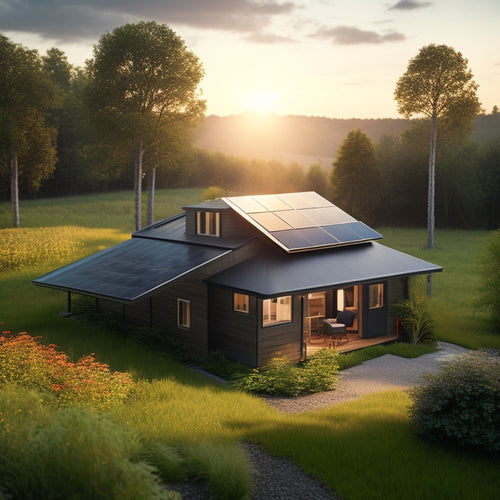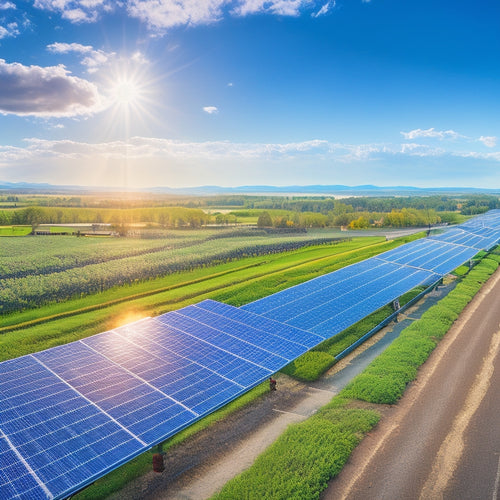
Sustainable Power Solutions for a Greener Tomorrow
Share
Embracing sustainable power solutions is key for nurturing a greener tomorrow. By utilizing renewable energy sources like solar, wind, and geothermal, you'll lower your carbon footprint and greatly cut energy costs over time. Each of these renewable options offers unique savings, with solar potentially reducing your bills by $1,500 annually. They also encourage energy independence, shielding you from fluctuating prices. Additionally, smart technology and energy audits can optimize your consumption habits for further savings. Making eco-friendly choices isn't just beneficial for the planet; it also leads to a sustainable financial future. Investigate how these solutions can reshape your energy strategy.
At a Glance
- Harnessing renewable energy sources like solar and wind significantly reduces greenhouse gas emissions and promotes environmental sustainability.
- Investing in sustainable power leads to long-term savings on energy bills, with potential annual savings of $1,200 to $1,800.
- Implementing energy-efficient technologies and conducting audits can optimize consumption, resulting in lower utility costs and enhanced economic stability.
- Community initiatives encourage local engagement in renewable energy adoption, fostering environmental stewardship and promoting cleaner practices.
- Diversifying energy portfolios with various renewable sources ensures long-term sustainability and contributes to carbon neutrality.
Eco-Friendly Energy Source
When you consider the pressing need for sustainable energy, exploring renewable energy options becomes essential.
These eco-friendly sources not only reduce your carbon footprint but also offer long-term economic benefits, with potential savings reaching thousands over the lifespan of solar systems.
Renewable Energy Options
The pursuit of sustainability fuels a growing interest in renewable energy options, which offer eco-friendly alternatives to traditional power sources.
With advancements in solar technology, you can utilize the sun's energy for your home or business, reducing dependence on fossil fuels. Wind innovation is another avenue, providing powerful turbines that capture wind energy, especially in areas with consistent breezes.
Geothermal systems tap into the Earth's heat, offering a stable energy source for heating and cooling. Biomass solutions convert organic materials into energy, promoting waste reduction and sustainable agriculture. Hydroelectric power, generated by flowing water, remains a reliable option, especially in regions with rivers and dams.
To maximize these renewable sources, energy storage technologies are vital. Smart grids help manage energy distribution, ensuring efficiency and reliability.
If you drive an electric vehicle, you directly support the shift to cleaner energy, reducing emissions and fuel costs.
Community initiatives play an important role in promoting these renewable options, encouraging local engagement and giving people the means to make a difference.
Benefits of Sustainability
Embracing sustainable energy sources not only benefits the environment but also enhances your economic stability. By adopting sustainable practices, you can reduce your utility bills considerably. Renewable energy solutions like solar and wind power offer long-term savings compared to traditional energy sources, which can fluctuate in price.
Additionally, increasing your energy efficiency means you'll consume less energy overall, which translates to lower costs. This isn't just about saving money; it's about creating a self-sufficient future. When you invest in eco-friendly energy solutions, you also contribute to job creation in the green sector, nurturing a strong economy that champions innovation.
The freedom to choose sustainable energy options enables you to take control of your energy consumption. You're not just a passive consumer; you become a proactive participant in shaping a greener future. Moreover, as society shifts towards sustainability, you position yourself ahead of the curve, opening doors to new opportunities.
Choosing sustainable energy sources aligns your values with your actions, ensuring a cleaner environment and a more stable economy. Ultimately, embracing these practices is more than a choice—it's a commitment to a sustainable and prosperous tomorrow.
Cost Savings Over Time
When you invest in sustainable power solutions, you're not just making an eco-friendly choice; you're also setting yourself up for significant long-term savings.
Solar panel and battery kits can lead to reduced grid reliance and lower energy bills, providing a self-sustaining system that converts solar energy into usable electricity.
Over time, reduced energy bills can lead to a substantial return on investment that outweighs initial costs.
Long-Term Investment Benefits
Investing in sustainable power solutions often results in significant cost savings over time. By making a green investment today, you can tap into a future where your energy expenses are minimized. Financial incentives, such as tax credits and rebates, can further enhance your returns, allowing you to allocate funds elsewhere, promoting both freedom and financial stability.
Consider the following table, which illustrates potential long-term savings:
| Investment Type | Initial Cost | Estimated 5-Year Savings |
|---|---|---|
| Solar Panels | $15,000 | $8,000 |
| Wind Turbines | $50,000 | $30,000 |
| Energy-Efficient Appliances | $5,000 | $2,500 |
| Electric Vehicles | $35,000 | $10,000 |
| Home Insulation | $8,000 | $4,000 |
These figures highlight how your upfront investment can yield substantial savings. You're not just spending money; you're securing a more independent and sustainable lifestyle. Embracing these solutions today means you're choosing financial freedom for tomorrow, breaking free from the constraints of fluctuating energy prices and contributing to a healthier planet.
Reduced Energy Bills
Utilizing sustainable power solutions leads to greatly reduced energy bills, allowing you to keep more money in your pocket. When you invest in energy-efficient systems, you not only lower your immediate costs but also create a long-term financial strategy that pays dividends.
Smart technology, such as programmable thermostats and energy-monitoring apps, enables you to track and optimize your energy use. Just imagine being able to control your energy consumption from your smartphone, adjusting settings in real-time to avoid waste. This freedom to manage your energy usage directly translates into tangible savings on your utility bills.
By adopting these innovative solutions, you're taking control of your finances and reducing dependence on fluctuating energy rates. Moreover, many sustainable power solutions come with rebates and incentives, further enhancing your savings.
The upfront investment may seem intimidating, but the cumulative effect of reduced bills over time can lead to significant cost savings. As you adopt energy efficiency, you're not just cutting costs—you're investing in a future where you have the freedom to choose how you spend your hard-earned money.
Make the shift today, and watch your energy bills shrink while your savings grow.
Key Advantages of Sustainable Energy
Sustainable energy offers you the chance to greatly reduce your environmental footprint while also enjoying long-term economic benefits.
By investing in renewable sources, you're not only contributing to a healthier planet but also saving on energy costs over time. Embracing these solutions can lead to a more sustainable future for both your wallet and the environment.
Additionally, utilizing solar power leads to energy independence and resilience, enabling you to manage your energy consumption effectively.
This change not only promotes community satisfaction but also decreases vulnerability to unpredictable electricity rate hikes.
Environmental Impact Reduction
The shift towards renewable energy sources like solar and wind power presents a powerful opportunity to markedly reduce environmental impact. By embracing green technology, you can play an essential role in promoting energy efficiency and sustainable practices. Utilizing renewable energy helps achieve carbon neutrality, a goal that aligns with your desire for freedom from harmful emissions and dependence on fossil fuels.
Making eco-conscious choices is crucial in the current climate. When you opt for sustainable energy solutions, you contribute to environmental stewardship and encourage ecological balance. These actions support conservation strategies that not only protect natural resources but also improve climate resilience, ensuring that future generations can enjoy a healthier planet.
Moreover, the integration of renewable energy sources leads to significant waste reduction. By capturing the power of the wind and sun, you minimize environmental degradation caused by traditional energy production.
This proactive approach allows you to be part of a groundbreaking movement, enabling yourself and others to advocate for a greener tomorrow. In doing so, you help create a sustainable future where the planet thrives, and generations to come can experience the freedom of a clean and lively environment.
Economic Cost Savings
Switching to renewable energy sources can lead to considerable economic cost savings for both individuals and businesses. As you investigate these options, you'll find numerous economic incentives that enhance financial viability, making the change not just environmentally responsible but also financially savvy.
| Type of Energy | Annual Savings |
|---|---|
| Solar Power | $1,500 |
| Wind Energy | $1,800 |
| Geothermal | $1,200 |
By investing in renewable energy, you can greatly reduce your energy bills over time. The initial cost may seem intimidating, but government subsidies and tax credits can offset those expenses, allowing you to reap the benefits sooner. Additionally, as energy prices fluctuate, relying on sustainable sources shields you from unpredictable market changes.
Moreover, businesses that adopt these solutions often find themselves more competitive. Lower operational costs translate into higher profit margins, enabling you to reinvest in growth and innovation. In a world where financial freedom is paramount, choosing sustainable energy isn't just a wise decision—it's a pathway to economic strength. Accept the change; your wallet and the planet will thank you.
Assess Your Energy Requirements
To effectively shift to sustainable power solutions, you first need to determine your energy consumption patterns.
By analyzing how and when you use energy, you can identify renewable energy sources that best suit your needs. Conducting a thorough energy needs assessment not only enhances your energy efficiency but also aligns with your commitment to sustainability.
This assessment enables you to pinpoint high usage areas and investigate reduction opportunities, ensuring a more informed approach to your energy consumption.
Determine Energy Consumption Patterns
Understanding your energy consumption patterns is essential for optimizing efficiency and reducing costs. By conducting energy audits, you can gain significant understandings into how and when you use energy. This process allows you to identify consumption trends that may be draining your resources unnecessarily.
Start by tracking your daily and monthly energy usage, noting peak times and significant fluctuations. You'll uncover whether specific appliances or habits are contributing to higher bills. Once you've pinpointed these patterns, you can make informed decisions about where to cut back or adjust your habits.
For example, if you notice that your energy usage spikes during certain hours, consider shifting heavy usage tasks to off-peak times. This not only lowers your costs but also promotes a more balanced and sustainable energy grid.
Embracing these practices enables you to take control of your energy consumption, leading to greater independence and sustainability in your daily life.
Identify Renewable Energy Sources
Identifying renewable energy sources requires a clear assessment of your energy needs and usage patterns. Start by evaluating how much energy you consume daily and which appliances use the most power. This understanding helps you determine the most suitable renewable options.
Solar power is a popular choice for homeowners, especially with community solar programs and renewable incentives. Wind energy, where applicable, can also provide significant savings.
Consider geothermal heating for efficient climate control, tapping into the Earth's natural temperatures. Biomass energy can serve as a versatile source, utilizing organic materials for power generation.
Hydroelectric power utilizes flowing water, and if you're near a river or stream, this could be a feasible option. Additionally, tidal energy offers potential for coastal residents.
As you investigate these sources, don't forget the importance of energy storage systems. They enable you to store excess energy generated during peak production times, ensuring you have power when demand rises.
Lower Carbon Footprint Impact
To lower your carbon footprint, incorporating renewable energy sources into your energy mix is essential.
By utilizing wind, solar, or hydropower, you can greatly reduce greenhouse gas emissions while promoting sustainability.
It's not just an environmental choice; it's also a smart investment for a cleaner, more resilient future.
Renewable Energy Sources
The urgency of shifting to renewable energy sources has never been clearer, as society grapples with the pressing need to reduce carbon footprints. By embracing renewable options like solar technology and wind innovation, you can help pave the way to a sustainable future. Each source contributes uniquely to carbon neutrality and energy efficiency.
| Renewable Source | Advantages | Innovations |
|---|---|---|
| Solar Technology | Low emissions, abundant availability | Advanced photovoltaic cells |
| Wind Innovation | High energy output, low land usage | Offshore wind farms |
| Geothermal Potential | Constant energy supply, minimal impact | Enhanced geothermal systems |
| Hydroelectric Advancements | Reliable, controllable energy | Smart grid integration |
Biomass utilization and tidal energy also play critical roles in diversifying your energy portfolio. With energy storage solutions and smart grids, you can optimize usage and guarantee sustainability. Shifting to these renewable sources isn't just a choice; it's a commitment to freedom from fossil fuel dependency. By investing in these technologies, you're not only enhancing your energy independence but also safeguarding the planet for future generations. Your actions today can lead to a greener tomorrow.
Frequently Asked Questions
What Are the Best Sustainable Energy Sources for Residential Use?
You'll find solar panels and wind turbines ideal for capturing energy efficiently. Pair them with energy storage, geothermal heating, or biomass energy. Implementing smart grids and hydropower systems enhances your home's energy efficiency and freedom.
How Can Businesses Transition to Sustainable Energy Solutions?
Imagine your business as a ship steering toward sustainability. Start with energy audits to identify efficiency gaps, then adopt corporate responsibility by investing in renewable sources. You'll not only save costs but also inspire others.
Are There Government Incentives for Adopting Sustainable Power Solutions?
Yes, there're government incentives available for adopting sustainable power solutions. You can benefit from tax credits and grant programs that considerably reduce costs, allowing you to invest in cleaner energy while enjoying greater financial freedom.
What Types of Technology Are Used in Renewable Energy Systems?
Imagine utilizing nature's power—solar panel innovations, wind turbine advancements, and geothermal energy applications combine with energy storage technologies and smart grid systems, while hydropower developments, bioenergy solutions, and wave energy converters pave your path to freedom.
How Can Individuals Contribute to Sustainable Energy Initiatives?
You can contribute to sustainable energy initiatives by practicing personal energy conservation at home and participating in community solar initiatives. Your efforts not only reduce your carbon footprint but also enable your community toward a brighter, cleaner future.
Explore More
In embracing sustainable power solutions, you're not just choosing energy; you're joining a movement towards a greener tomorrow. Think of it as planting a seed today for a flourishing planet tomorrow—every small step counts. By evaluating your needs and investing in eco-friendly energy, you'll not only save costs over time but also reduce your carbon footprint. The future is bright for those who take action now, and your choice could inspire others to follow suit. Let's power a better world together.
Related Posts
-

Diy Off Grid Solar
By embracing DIY off-grid solar, you can break free from grid dependence, slashing your energy bills by up to 90% and...
-

Applications of Photovoltaic Systems
Photovoltaic systems are versatile, converting sunlight into electricity for various applications. You can use them i...
-

Designing a Green Roof for Maximum Energy Efficiency
Designing a green roof for maximum energy efficiency involves several key strategies. Start by selecting native, drou...


